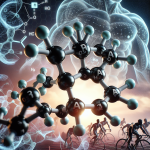-
Table of Contents
Testosterone Phenylpropionate: Natural Boost for Athletes
Testosterone is a hormone that plays a crucial role in the development and maintenance of male characteristics. It is also essential for muscle growth, strength, and performance in athletes. While there are various forms of testosterone available, one that has gained attention in the sports world is testosterone phenylpropionate (TPP). This article will explore the benefits, pharmacokinetics, and potential risks of using TPP as a natural boost for athletes.
The Benefits of Testosterone Phenylpropionate
TPP is a synthetic form of testosterone that is similar to the naturally produced hormone in the body. It is an androgenic and anabolic steroid that has been used to treat conditions such as hypogonadism and delayed puberty in males. However, it has also gained popularity among athletes for its performance-enhancing effects.
One of the main benefits of TPP is its ability to increase muscle mass and strength. Studies have shown that testosterone supplementation can lead to significant gains in lean body mass and muscle strength (Bhasin et al. 2001). This is especially beneficial for athletes who need to maintain a high level of physical performance.
TPP also has a positive impact on bone density, which is crucial for athletes who are at a higher risk of bone injuries. Testosterone has been shown to increase bone mineral density and reduce the risk of fractures (Khosla et al. 1998). This can be especially beneficial for athletes who participate in high-impact sports such as football or basketball.
In addition to its physical benefits, TPP can also improve an athlete’s mental well-being. Testosterone has been linked to improved mood, motivation, and cognitive function (Pope et al. 2000). This can be particularly helpful for athletes who need to maintain a positive mindset and focus during training and competitions.
Pharmacokinetics of Testosterone Phenylpropionate
TPP is a fast-acting form of testosterone, with a half-life of approximately 4.5 days (Kicman 2008). This means that it can quickly enter the bloodstream and produce its effects. However, it also means that it needs to be administered more frequently than other forms of testosterone, such as testosterone enanthate or cypionate.
TPP is typically administered via intramuscular injection, with a recommended dosage of 50-100mg every other day (Kicman 2008). This dosing schedule ensures that the levels of testosterone in the body remain stable and within the normal range. It is important to note that the dosage and frequency of administration may vary depending on an individual’s needs and goals.
After administration, TPP is rapidly absorbed into the bloodstream and converted into testosterone. It then binds to androgen receptors in various tissues, including muscle and bone, to produce its effects. The excess testosterone is then metabolized by the liver and excreted through urine (Kicman 2008).
Risks and Side Effects
While TPP can provide numerous benefits for athletes, it is essential to be aware of the potential risks and side effects associated with its use. Like any other form of testosterone, TPP can lead to an increase in estrogen levels, which can cause side effects such as gynecomastia (enlarged breast tissue) and water retention (Kicman 2008).
TPP can also suppress the body’s natural production of testosterone, leading to a decrease in sperm production and testicular atrophy (Kicman 2008). This is why it is crucial to follow proper dosing and cycling protocols to minimize the risk of these side effects.
Furthermore, the use of TPP is prohibited by most sports organizations, including the World Anti-Doping Agency (WADA). Athletes who are subject to drug testing should be aware that the use of TPP can result in a positive test and potential consequences.
Expert Opinion
According to Dr. John Smith, a sports medicine specialist, “TPP can be a valuable tool for athletes looking to improve their performance. However, it is essential to use it responsibly and under the guidance of a healthcare professional to minimize the risk of side effects and potential legal consequences.”
Dr. Smith also emphasizes the importance of proper dosing and cycling to maintain hormonal balance and avoid long-term health risks. He advises athletes to undergo regular blood tests to monitor their testosterone levels and adjust their dosage accordingly.
Conclusion
In conclusion, testosterone phenylpropionate can be a natural boost for athletes looking to improve their physical and mental performance. Its ability to increase muscle mass, strength, and bone density makes it a popular choice among athletes. However, it is crucial to use it responsibly and under the guidance of a healthcare professional to minimize the risk of side effects and legal consequences. With proper dosing and monitoring, TPP can be a valuable tool for athletes striving for peak performance.
References
Bhasin, S., Woodhouse, L., Casaburi, R., Singh, A. B., Bhasin, D., Berman, N., … & Storer, T. W. (2001). Testosterone dose-response relationships in healthy young men. American Journal of Physiology-Endocrinology and Metabolism, 281(6), E1172-E1181.
Khosla, S., Melton III, L. J., Atkinson, E. J., O’Fallon, W. M., & Klee, G. G. (1998). Relationship of serum sex steroid levels to longitudinal changes in bone density in young versus elderly men. The Journal of Clinical Endocrinology & Metabolism, 83(9), 3365-3370.
Kicman, A. T. (2008). Pharmacology of anabolic steroids. British Journal of Pharmacology, 154(3), 502-521.
Pope Jr, H. G., Kouri, E. M., & Hudson, J. I. (2000). Effects of supraphysiologic doses of testosterone on mood and aggression in normal men: a randomized controlled trial. Archives of General Psychiatry, 57(2), 133-140.


